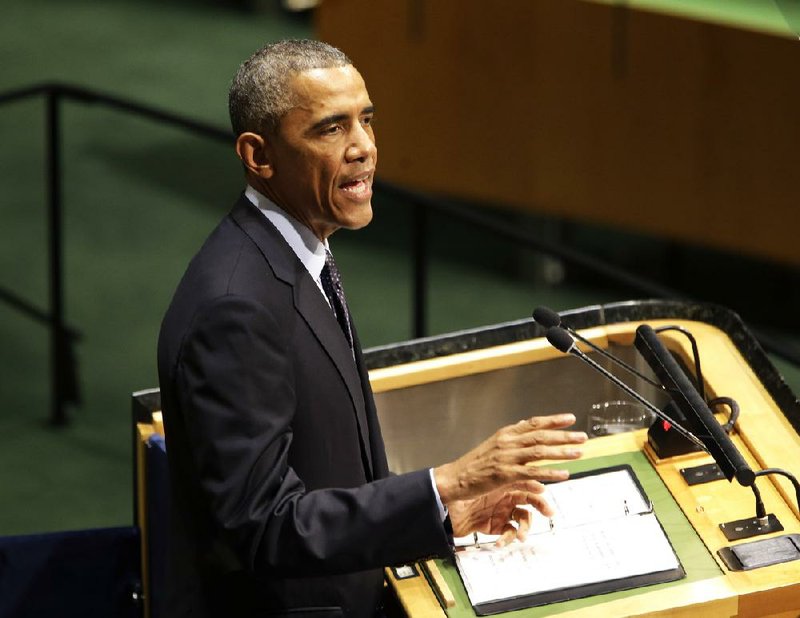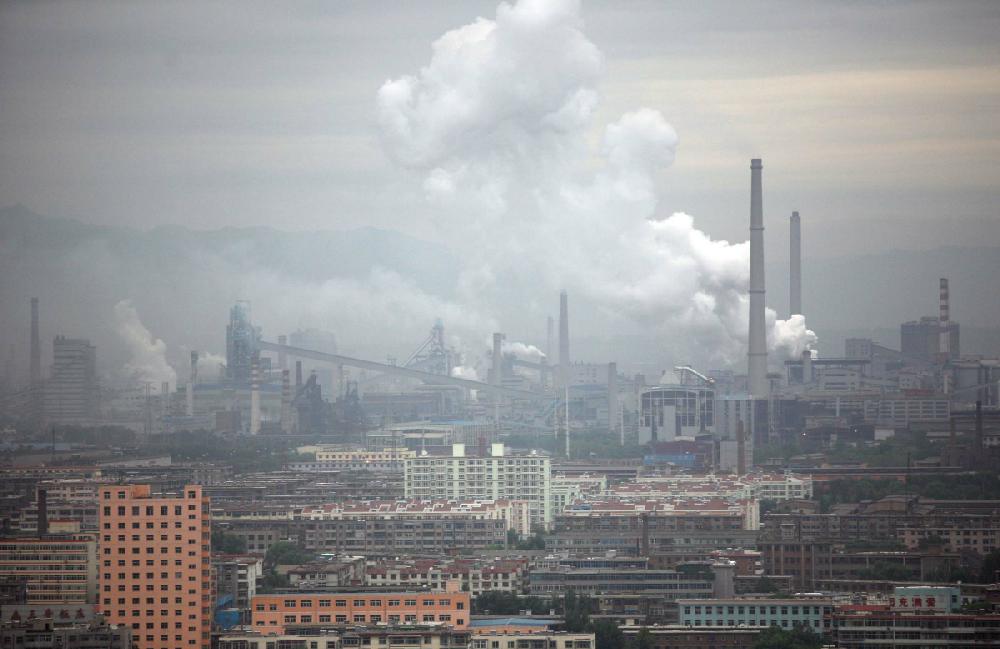UNITED NATIONS -- President Barack Obama on Tuesday sought to marshal more than 100 world leaders behind a vast international effort to reduce greenhouse-gas emissions and curb global warming.
But Obama, in pledging that the United States would set ambitious new targets to cut emissions in advance of critical global-climate talks next year, will leave much of the hard work to his successor or even the president after that. And in many countries, the mechanisms for achieving deep cuts in carbon emissions remain as politically and economically difficult as ever.
"Yes, this is hard," Obama said to the United Nations General Assembly, "but there should be no question that the United States of America is stepping up to the plate."
Nonetheless, he warned that the efforts would fail without significant cooperation from countries around the world. "We can only succeed in combating climate change if we are joined in this effort by every nation, developed and developing alike. Nobody gets a pass," the president said.
Speaking after a summer he called the "hottest ever recorded," the president unveiled a series of initiatives designed to help developing nations protect themselves against the ravages of a warming planet. For the first time he committed the U.S. to offer new lower emissions targets for the period after 2020. And he detailed several public-private partnerships the U.S. government is joining to combat climate change.
Under the U.S. plan, poorer nations will be given access to improved weather risk assessments as well as new global elevation data. The protective measures will "harness the unique scientific and technological capabilities of the United States," the White House said in a statement.
The day-long climate meeting, organized by the U.N. secretary-general, Ban Ki-moon, showcased how climate change has become a global preoccupation but also reinforced the divides between developed and developing countries.
Obama promoted the executive action he announced this year, which mandates cutting pollution from the nation's power plants by 30 percent, from 2005 levels, by 2030. The U.S., he said, would meet its previous pledge to reduce the nation's overall carbon emissions by 17 percent, from 2005 levels, by 2020.
Reciting record-setting temperatures and a series of natural disasters, from hurricanes and wildfires to droughts and floods, Obama tried to raise the urgency of climate change during a U.N. meeting that has been dominated by fears of terrorism.
"We are the first generation to feel the impact of climate change and the last generation that can do something about it," Obama said.
Earlier this month, the World Meteorological Organization reported that the main drivers of climate change are continuing to rise. Atmospheric levels of carbon dioxide, which scientists have called the most important contributor to man-made climate changes, are now 42 percent higher than in 1750, the organization said.
The increase in carbon dioxide from 2012 to 2013 was the largest annual change in the past 29 years, the report said.
Much of the attention at the summit focused on China, the world's largest carbon emitter. President Xi Jinping chose not to attend the meeting, sending Zhang Gaoli, his vice premier, who presented his own figures to make the case that China was doing its part.
China's carbon intensity, Zhang said, was down 28 percent this year from 2005 levels. Renewable energy accounts for 24 percent of China's installed capacity, he said, and the nation is on track to meet its goal of reducing emissions by 40-45 percent, from 2005 levels, by 2020.
"As a responsible major developing country, China will make an even greater effort to address climate change and take on international responsibilities that are commensurate with our national conditions," Zhang said.
The parade of speeches was the largest gathering ever of world leaders devoted to climate change. It followed a Sunday march through New York of more than 400,000 people, the largest political demonstration on climate change.
"We need to take action now to limit global temperature rise," said Ban, in opening the session. "We need all hands on deck to ride out this storm."
The aim of this week's talks is to start efforts to broker a deal next year in Paris that will bind the world's largest carbon polluters -- the U.S., China, Russia, India, the European Union, Brazil, Japan, and others -- to enacting laws to cap their use of coal, which supplies billions of people with cheap electricity, and the oil and gasoline that fuel the planet's cars and trucks.
In addition to Obama's pledges, the European Union said its member nations next month were set to approve a plan that would cut greenhouse gases back to 40 percent below 1990 levels by 2030. The EU also called for using renewable energy for 27 percent of the bloc's power needs and increasing energy efficiency by 30 percent.
But the talks revealed the sharp differences that divide nations. More than 150 countries set the first-ever deadline to end deforestation by 2030, but that goal was thrown into doubt when Brazil, home to the Amazon rain forest, said it would not join.
Forests are important because they absorb carbon dioxide. The United States, Canada and the entire European Union signed onto a declaration to halve forest loss by 2020 and eliminate deforestation entirely by 2030.
If the forest goal is met, the U.N. says it would be the equivalent of taking every car in the world off the road. A group of companies, countries and nonprofits also pledged to restore more than 1 million square miles of forest worldwide by 2030. Norway promised to spend $350 million to protect forests in Peru and another $100 million in Liberia.
World leaders on Tuesday also pledged to spend at least $5 billion making the world more sustainable. France promised $1 billion. Korea pledged $100 million. Others, like Chile, pledged cuts in greenhouse gas emissions by 2020.
But those pledges fell far short of previous goals. A 2009 agreement called the Copenhagen Accord called for developed countries to contribute $10 billion a year in 2010 and scale it up to $100 billion a year by 2020 to help developing countries cut emissions and adapt to a changing climate.
Venezuelan President Nicolas Maduro chastised "polluting powers," such as the U.S., for causing an "evil of such planetary dimensions" and then trying to barter their way out of their responsibilities.
Seychelles President James Michel called small island nations like his "victims of this pollution" and said it was up to the countries that burn the most coal, oil and gas to do the most.
"If they don't do something, the Earth will not survive, and that will be the end of us all," Michel said.
Since the failure of earlier international summits, the U.S. profile on the issue has improved somewhat. The shale gas revolution has helped reduce U.S. carbon emissions and cut imports of foreign oil.
The administration also worked with automakers to agree on fuel-efficiency standards that will require an average of 54.5 miles per gallon for cars and light trucks by 2025. Those standards will cut oil consumption by 12 billion barrels and halve vehicle emission by 2025, according to the White House.
However, Obama and other Democrats have found some of their proposed actions rejected as they have had difficulty convincing some congressional Republicans that climate change is real.
Peter Ogden, former White House director for climate change in the Obama administration, said the president's climate plan will achieve the same greenhouse gas reductions "in 2020 that would have been achieved under the Waxman-Markey bill that passed the House in 2009."
That bill, the American Clean Energy and Security Act, would have established a a cap and trade system, under which the U.S. would set a limit on the amount of greenhouse gases that can be emitted. Companies would have to buy permits to emit the gases, and they could sell any extra permits to companies with higher emissions.
Critics of the bill worried about its economic costs, which they said would come with only a very small reduction in overall emissions.
Recently, the White House has been trying to frame the climate change battle as a potential benefit for the U.S. economy rather than a certain cost.
"There does not have to be a conflict" between economic growth and sound environmental policy, the president said.
Information for this article was contributed by Mark Landler and Coral Davenport of The New York Times; by Dina Capiello, Seth Boernstein and staff members of The Associated Press; and by David J. Lynch, Mark Drajem and Alex Nussbaum of Bloomberg News.
A Section on 09/24/2014

